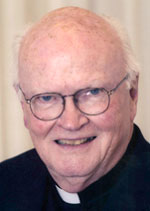At their November 2012 meeting in Baltimore, the U.S. bishops gave overwhelming approval to a document titled “Preaching the Mystery of Faith: The Sunday Homily.” It was the first time in 30 years that they addressed the issue of the quality of preaching in our nation’s parishes.
They didn’t say so explicitly, but the bishops seem to think that we are losing the game in the pulpit, and the people — those who are still showing up — are looking for and deserving of much better preaching. As a friend put it to me not long ago, here in the U.S., “we have Saturday Night Live and Sunday morning dead.”
We can do better. And the bishops are now saying we must.
The document says that “the homily is intended to establish a ‘dialogue’ between the sacred biblical text and the Christian life of the hearer.”
I would make that same point in different words. I would say that the homily is intended to be an extension of the proclamation of the Scripture texts that are part of every Mass. That proclamation should be filtered through the faith experience of the homilist, and then matched up with the faith experience of the people in the pews.
It may sound self-serving, and I don’t at all intend it to be, but it is fortuitous that my latest book, “The Word Received: A Homily for Every Sunday of the Year — Year C” arrived in bookstores the same week when the bishops released their document on preaching. The companion books — “The Word Proclaimed” and “The Word Explained,” containing homilies for every Sunday in Years A and B, respectively — will be released by Paulist Press in each of the next two Novembers.
These homilies have all been road tested in parish churches or university chapels. It is my hope that they will give priests and deacons a few ideas for their homilies and provide Scripture-based spiritual reading for interested people in the pews.
On the floor of the bishops’ meeting while the preaching document was being discussed, Bishop Ricardo Ramirez of Las Cruces, N.M., pleaded for an amendment that would urge Catholics to make an extra effort to listen to heavily accented foreign-born priests in order to grasp their message.
He pointed out that “they have wisdom” and are “inspired by the Holy Spirit.” Perhaps the heavy-accented preachers should be encouraged to write their homilies out, in English of course, and have them reproduced and available in the pews so that willing worshippers can read and understand their inspiring words.
Similarly, pastors might be encouraged to have acoustical checks run on their sound systems and require auditions for all lectors to guarantee that the Scripture readings are proclaimed audibly and clearly so all can hear.
This is a critically important issue for the church today. That’s why the bishops addressed it. It remains to be seen what impact their document will have on parishes, seminaries and training programs for deacons and lectors.
***
Jesuit Father William J. Byron is university professor of business and society at St. Joseph’s University, Philadelphia. Email: wbyron@sju.edu.
PREVIOUS: Help special-needs people enjoy Advent, Christmas events
NEXT: Breakups don’t always lead to a bad outcome




I have the greatest respect for the excellent preachers in our church like fathers Burghardt and Byron, however the Catholic people continue to have the mentality of being required to be present in the church, at least in our area, insists on very brief homilies (10 minutes). The message Catholic skit is that the homily is not a terribly significant part of the Mass. in other, non-Catholic, churches where sermons are given they can consume 20 minutes to an hour, and in some places more. There, those who attend realize that what the preacher is saying is a significant aspect of the church service. I know there are some very talented homilists who in 10 minutes can spell bind and convince. But for most preachers to really get across the substance of the word more time is required.